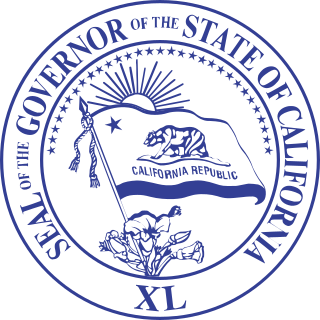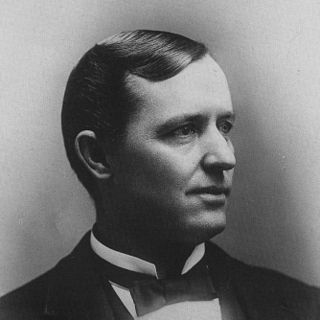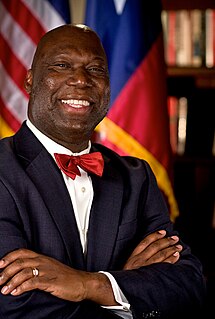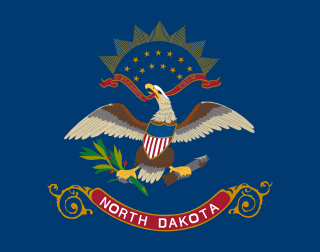
The Libertarian Party (LP) is a political party in the United States that promotes civil liberties, non-interventionism, laissez-faire capitalism, and limiting the size and scope of government. The party was conceived in August 1971 at meetings in the home of David F. Nolan in Westminster, Colorado, and was officially formed on December 11, 1971, in Colorado Springs, Colorado. The founding of the party was prompted in part due to concerns about the Nixon administration, the Vietnam War, conscription, and the introduction of fiat money.

The governor of California is the head of government of the U.S. state of California. The governor is the commander-in-chief of the California National Guard and the California State Guard.

The 1982 United States Senate elections were held on November 2, 1982. They were elections for the United States Senate following Republican gains in 1980. A total of four seats changed hands between parties, and the lone independent, Senator Harry Byrd Jr., retired. Democrats made a net gain of one seat in the elections. A special election was held in Washington state in 1983.

The 2008 United States Senate elections were held on November 4, 2008, with 35 of the 100 seats in the Senate being contested. Thirty-three seats were up for regular elections; the winners were eligible to serve six-year terms from January 3, 2009 to January 3, 2015, as members of Class 2. There were also two special elections, the winners of those seats would finish the terms that ended January 3, 2013.

The 2006 Texas gubernatorial election was held on November 7, 2006, to elect the Governor of Texas. The election was a rare five-way race, with incumbent Republican Governor Rick Perry running for re-election against Democrat Chris Bell and Independents Carole Keeton Strayhorn and Kinky Friedman, as well as Libertarian nominee James Werner. Perry was re-elected to a second full term in office, winning 39% of the vote to Bell's 30%, Strayhorn's 18% and Friedman's 12%.

United States gubernatorial elections were held on November 4, 2008, in 11 states and two territories. Prior to the election, eight of the total seats were held by Democrats and five by Republicans. Two governors were prohibited by term limits from seeking re-election in 2008. The only governorship to change party was the open seat in Missouri, which was won by a Democrat after being previously held by a Republican.

The 2006 Texas General Election was held on Tuesday, 7 November 2006, in the U.S. state of Texas. Voters statewide elected the Governor, Lieutenant Governor, Attorney General, Comptroller of Public Accounts, Commissioner of the General Land Office, Commissioner of Agriculture, and one Railroad Commissioner. Statewide judicial offices up for election were the chief justice and four justices of the Texas Supreme Court, and the presiding judge and two judges of the Texas Court of Criminal Appeals.

Lee Mantle was an American businessman and politician from Montana. A Republican, he was most notable for his service as a United States Senator from 1895 to 1899.

Michael Lawrence Williams is the former Education Commissioner of the U.S. state of Texas, in which capacity he was leader of the Texas Education Agency. Williams was appointed to the position on August 27, 2012, by then Governor Rick Perry. On October 15, 2015, Williams announced that he would step down as Education Commissioner at the end of the year to return to the private sector.

Elections in California are held to fill various local, state and federal seats. In California, regular elections are held every even year ; however, some seats have terms of office that are longer than two years, so not every seat is on the ballot in every election. Special elections may be held to fill vacancies at other points in time. Recall elections can also be held. Additionally, statewide initiatives, legislative referrals and referenda may be on the ballot.
In the United States, a governor serves as the chief executive officer and commander-in-chief in each of the fifty states and in the five permanently inhabited territories, functioning as head of government therein. As such, governors are responsible for implementing state laws and overseeing the operation of the state executive branch. As state leaders, governors advance and pursue new and revised policies and programs using a variety of tools, among them executive orders, executive budgets, and legislative proposals and vetoes. Governors carry out their management and leadership responsibilities and objectives with the support and assistance of department and agency heads, many of whom they are empowered to appoint. A majority of governors have the authority to appoint state court judges as well, in most cases from a list of names submitted by a nominations committee.

The politics of North Dakota were shaped historically by early settlement by people from the Northern Tier, who carried their politics west ultimately from New England, upstate New York, and the Upper Midwest. The area and state also received numerous European immigrants and migrants, particularly during the era of opening up of former Native American lands for sale and settlement. Since the late 19th century, the Republican Party has been influential in the state.

The 2002 United States House of Representatives elections in South Carolina were held on November 5, 2002 to select six Representatives for two-year terms from the state of South Carolina. The primary elections for the Democrats and the Republicans were held on June 11 and the runoff elections were held two weeks later on June 25. All five incumbents who ran were re-elected and the open seat in the 3rd congressional district was retained by the Republicans. The composition of the state delegation remained four Republicans and two Democrats.

The 1980 Oregon United States Senate election was held on November 4, 1980 to select the U.S. Senator from the state of Oregon. Republican candidate Bob Packwood was re-elected to a third term, defeating Democratic state senator Ted Kulongoski and Libertarian Tonie Nathan.

The Ohio general elections, 2010 were held on November 2, 2010 throughout Ohio. Primary elections took place on May 4, 2010.

The 2014 California gubernatorial election was held on November 4, 2014, to elect the Governor of California, concurrently with elections for the rest of California's executive branch, as well as elections to the United States Senate in other states and elections to the United States House of Representatives and various state and local elections.

The 2018 United States Senate elections were held on November 6, 2018. 33 of the 100 seats were contested in regular elections while two others were contested in special elections due to Senate vacancies in Minnesota and Mississippi. The winners were elected to six-year terms running from January 3, 2019, to January 3, 2025. Senate Democrats had 26 seats up for election, while Senate Republicans had nine seats up for election.
Kenneth James Fanning is an American hunting and fishing guide and former politician. In 1980, Fanning was elected to the Alaska House of Representatives as a Libertarian, becoming the second person elected to a U.S. state legislature under that party, following his political mentor Dick Randolph. Fanning served a single term, losing reelection. He later joined the Republican Party and was appointed to fill out a vacancy in the Alaska Senate in 1987, serving in that body for a little over a year.

The 2020 United States Senate elections were held on November 3, 2020, with the 33 class 2 seats of the Senate contested in regular elections. Of these, 21 were held by Republicans, and 12 by Democrats. The winners were elected to six-year terms from January 3, 2021, to January 3, 2027. Two special elections for seats held by Republicans were also held in conjunction with the general elections: one in Arizona, to fill the vacancy created by John McCain's death in 2018; and one in Georgia, following Johnny Isakson's resignation in 2019. In both races, the incumbent Republican lost to a Democrat. These elections ran concurrent with the 2020 United States presidential election in which incumbent Republican president Donald Trump lost to Democratic nominee Joe Biden.
A perennial candidate is a political candidate who frequently runs for public office without a reasonable chance of winning. The term is the opposite of an incumbent politician who repeatedly defends their seat successfully. In the U.S., perennial candidates are usually affiliated with third party politics.
















